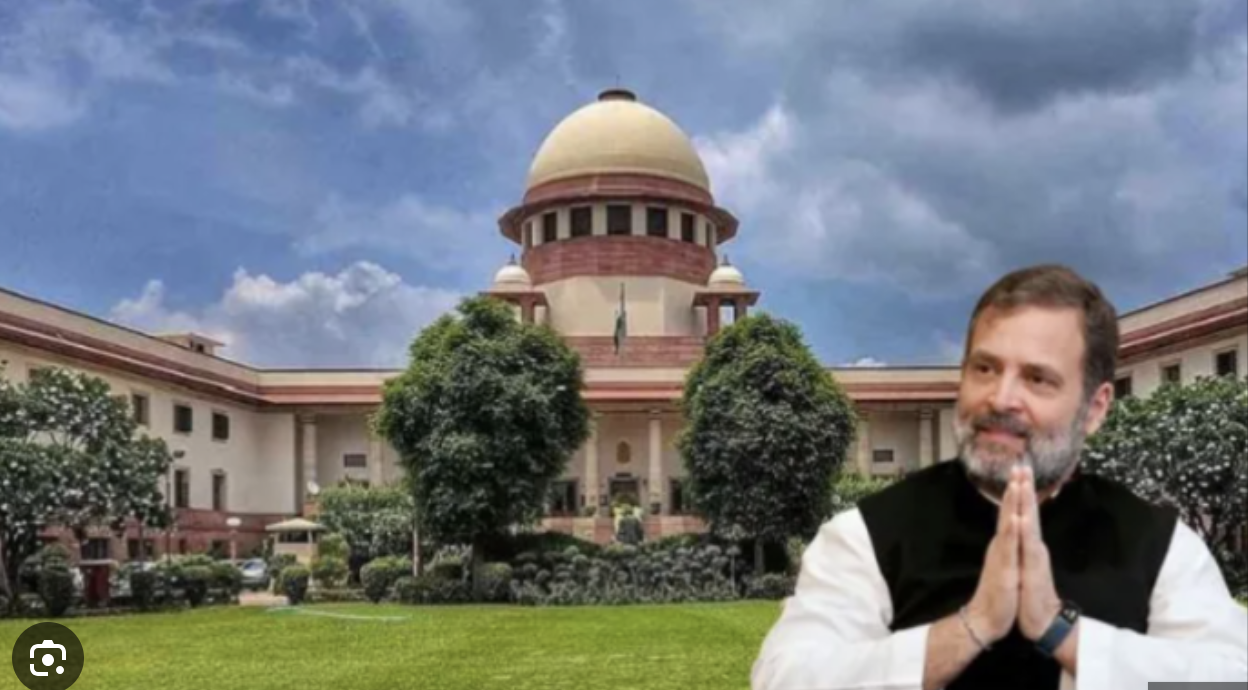New Delhi: The Supreme Court August 4 (Friday), stayed Congress leader and Former Wayanad MP Rahul Gandhi’s conviction in a 2019 criminal defamation case over his Modi surname remark. The apex court also restored his status as a member of Parliament.
While pronouncing the judgment, the 3-judge bench observed that the utterances of Rahul Gandhi were not in “good taste” and said that a person in public life ought to have been more careful while making public speeches. However, questioned why the maximum sentence was given, which led to his disqualification.
A three-judge bench of Justices BR Gavai, PS Narasimha, and Sanjay Kumar was hearing Gandhi’s plea challenging the Gujarat High Court’s refusal to stay his conviction in a criminal defamation case over ‘Modi thieves’ remark.
Purnesh Modi, a former minister in the Gujarat government, had filed a criminal defamation case in 2019 against Gandhi over his “How come all thieves have Modi as the common surname?” remark made during an election rally at Kolar in Karnataka on April 13, 2019. Rahul Gandhi was convicted and sentenced to two years in prison in a defamation case by a Surat court on March 23. The conviction led to his subsequent disqualification from Lok Sabha.
Senior advocate Mahesh Jethmalani appearing for complainant Purnesh Modi read out Rahul Gandhi’s 2019 speech and argued that the entire speech spanned over 50 minutes and there was a plethora of evidence and clipping of the speech attached to the Election Commission of India’s record.
Jethmalani said that Rahul Gandhi’s intention was to defame every person with the surname Modi just because it is the same as that of a Prime Minister, adding that the Congress senior leader “defamed an entire class out of malice.”
Meanwhile, Abhishek Manu Singhvi, who represented Congress leader Rahul Gandhi at the Supreme Court, said, “No one was named by Rahul Gandhi in his speech.”
The trial court cited 13 cases, but where are the convictions? Where are the criminal anecdotes, he told the apex Court.
He added, ‘Rahul Gandhi has lost two Parliament sessions. He has been silenced for 8 years. For no other defamation cases, 2 years of suspension were pronounced’
Singhvi also questions, Is it Rahul’s last chance to get acquittal?
Responding to the arguments, SC said the conviction is also affecting the constituency.
“Had the judgment of the SC may come earlier, the petitioner would have been more careful and expressed a degree of restraint over the alleged defamatory remarks. We are of the considered view that the ramifications of the ruling are wide and affect the rights of his constituency’s electorate. Considering the aforesaid and particularly that no reasons have been given by the trial judge for a maximum sentence that has incurred disqualification, the order of conviction needs to be stayed pendency of proceedings. Pendency of appeal would not come in the way of the appellate court in deciding an appeal in accordance with the law. Trial proceedings are to be conducted expeditiously,” said the apex court.
It added that it wants to know why the maximum sentence was given. Had the judge given a sentence of 1 year and 11 months, then he (Rahul Gandhi) would not have been disqualified, observed Supreme Court.
Rahul Gandhi refused to apologise
On Wednesday, the 2nd of August, Congress leader, and Former Wayanad MP Rahul Gandhi filed a rejoinder affidavit in the Supreme Court in relation to his appeal against his disqualification from the parliament. In the affidavit, he reiterated that he would not apologise for his Modi surname remark that led to his conviction by the lower court and subsequent disqualification from Lok Sabha. He submitted that if he had to apologise for his remarks, he would have done it earlier.
In the 63-page affidavit, Gandhi claimed that he has not committed any serious offence and there is no defamation case made out against him. He has argued that criminal defamation is not a serious offense involving moral turpitude. The affidavit further states that defamation is only one of the 22 offenses under the IPC that attracts only simple imprisonment and not rigorous imprisonment.
Rahul Gandhi has requested the Supreme Court to stay his two-year suspension in the defamation case so that he can attend the ongoing parliament session and the sessions in the future.
The case
The case pertains to 2019 criminal defamation case against Congress leader Rahul Gandhi. In his election speech in Koral, Karnataka, Rahul Gandhi mocked an entire community by saying, “Nirav Modi, Lalit Modi, Narendra Modi… how come they all have Modi as a common surname? How come all thieves have Modi as a common surname?”
After the court trial, on the 23rd of March, 2023, a magisterial court in Gujarat convicted Rahul Gandhi in connection with his Modi surname remark. The court sentenced him to
two-year imprisonment which subsequently lead to his disqualification as a Lok Sabha MP.
According to the Representation of People’s Act (RPA), a conviction of two or more years immediately leads to disqualification from the Parliament or state assemblies.
Later on 20 April, the sessions court rejected his plea for a stay on his conviction. Subsequently, the Gandhi scion moved to the Gujarat High Court which cited his stature as an MP and said he should have been more careful in his comments.
After hearing the matter, on the 7th of July, the high court affirmed the lower court’s order and rejected his revision application seeking a stay on his conviction.




COMMENTS